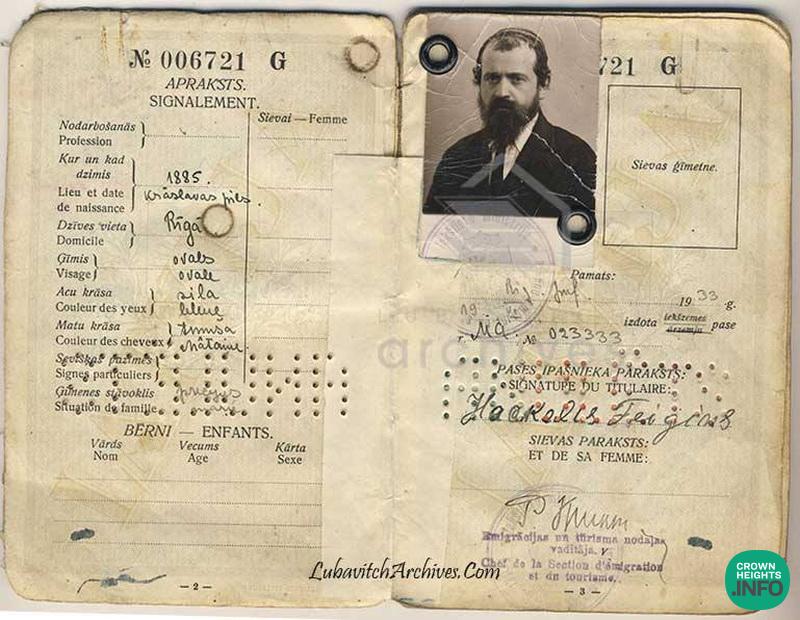
Weekly Story: Appreciation of the Rebbe Rayatz
by Rabbi Sholom DovBer Avtzon
I heard this week the following story from Rabbi Shlomo Galperin, the way it was reminisced by his father-in-law Rabbi Shmuel Tzvi Fox of blessed memory. As noted, pearls as these are what keeps this column going. Please share them with me, so that I can allow the community at large, to benefit from them as well.
As always, your comments and feedback are greatly appreciated.
Rabbi Yechezkel (known as Reb Chache!) Feigin hy”d, was one of the Frierdiker closest associates in Russia as well as in Riga and Poland. However, in addition to being one of the Rebbe’s secretaries, he had many other responsibilities. Before becoming a secretary, he was the mashpia in Tomchei Tmimim as well as being involved in many communal affairs, positions he continued serving in even after becoming a secretary of the Rebbe.
The Frierdiker Rebbe was aware that Reb Chache had barely any time for himself. On one occasion [when the Rebbe was residing in Otwock], the Rebbe said to him, Chache I know you are extremely occupied, you are involved in the yeshiva, not only as the mashpia, but in many other aspects as well. Additionally, you are very involved in communal affairs helping as many Jews as possible. In addition to all that, I also requested that you help me as my secretary, so you really do not have any time for yourself, and I cannot pay you adequate compensation for everything you do. [The poverty in the Rebbes household is impossible to describe] [However,] Every time you enter my room, I will relate to you a vort (saying), a story, or a hanhoge (custom) or a tnuye of my Father or one of the other Rebbeiim.
Reb Chatche would go in to the Rebbe’s room at least twice a day, carrying an overloading amount of piles of letters that were mailed to him from over the world, booklets and books being prepared for print, rolls of blueprints of institutions being planned to build and more objects for advice or approval of the Rebbe Rayatz.
From then on, as soon as Reb Chache left the Rebbe’s room, he called over the first student he happened to see and said to him, “there are two ways to remember something, either you write it down or you repeat it to somebody else. Being that I don’t have any time to write for myself so therefore I will repeat to you something I just heard from the Rebbe.”
One of the students whom he called over understood that this could be a treasure trove of valuable information about the Rebbeiim and how a chossid should conduct themselves. He therefore made the effort to be outside the Rebbe’s room as often as possible at that time, so therefore he would hear these phenomenal tidbits that the Rebbe had just related to Reb Chache.
Years later Rabbi Fox bemoaned that he did not have the foresight to record everything himself, noting that it would have filled up many notebooks.
Being that I am in the midst of concluding writing the biography of the Frierdiker Rebbe, and 150 pages were already edited, I will note here the secretaries of the Frierdiker Rebbe of whom I am aware of, with the request that the readers help me complete the list.
In Russia, Reb Elchonon Dov (Chony) Morosow (he was originally a secretary of the Rebbe Rashab) served as his secretary, until he was arrested shortly before Purim 5687 (1927).
Reb Chaim Liberman, who remained a secretary throughout the Frierdiker Rebbe’s life.
Reb Yechezkel Feigen, as noted, remained a secretary until the Rebbe left Europe.
In Europe, shortly before WWII, the Rebbe asked Rabbi Nissan Mindel to become one of his secretaries and continued in that function in America.
Shortly before leaving Europe, the Rebbe invited Rabbi Chaim Mordechai Aizik Hodakov to become his secretary.
In Poland the Rebbe appointed Rabbi Moshe Leib Rodshtein [his real name is Reb Zushe ben Mordechai Shifrin], became a secretary. Originally when he arrived in America in Cheshvan of 5701 (1940) the Rebbe instructed him to settle in Chicago, and five years later in the summer of 5706 (1946), did the Rebbe tell him to move to New York and resume his responsibilities of being the Rebbe’s secretary.
Rabbi Eliyahu Simpson was responsible for scheduling those whom the Rebbe granted them the ability of speaking to him in a yechidus.
There were many others that were extremely close to the Rebbe, such as Rabbi Mordechai Chefetz and Rabbi Shmuel Zalmanov, however, I am not aware if they served as one of his secretaries or not, or better said if they served only on a temporary basis, from time to time.
Our Rebbe also served as a secretary to his father-in-law, the Rebbe, from time to timr, in addition of being given additional responsibilities.
A Taste of Chassidus Isha Ki Sazria V’Yaldah Zachar 5748
The Torah tells us, “When a woman conceives and gives birth to a male…” Chazal explain that when the conception is initiated by the woman, the child is a male; when it originates from the man, the child is a female.
This reflects a deeper spiritual truth: in holiness, there is always room for something beyond itself—even something that appears to be its opposite. This is seen in the relationship between the Sefiros of Chesed (kindness) and Gevurah (restraint or judgment).
For example, when a teacher wants to impart a new idea to a student, the desire to teach stems from kindness (Chesed). Yet, in order for the lesson to be effective so that the student can comprehend it properly, the teacher must consider the student’s current level of understanding and limit the information accordingly. This act of restraint (Gevurah) is not a contradiction to the teacher’s kindness, but rather the very means through which the kindness can be properly received. The limitation is what allows the kindness to be internalized and beneficial.
Likewise, with Gevurah—the expression of severity or discipline—we see that in Torah, punishment is only permitted when its purpose is constructive: to correct and cleanse the soul, enabling the person to return to their original, elevated state. So even severity is ultimately rooted in kindness.
In this light, the distinction between male and female, as explained in Chassidus, reflects these spiritual dynamics. The man, generally seen as the provider, represents Chesed. The woman, as the receiver, corresponds to Gevurah. Therefore, when the woman initiates the conception, the result is a male (Chesed emerging from Gevurah). When the man initiates, the result is a female (Gevurah emerging from Chesed). This exchange illustrates the profound spiritual interplay where opposites give rise to one another.
This concept also helps explain seemingly troubling aspects of Torah. For instance: how can the pure and truthful Torah which includes the Talmud record ideas which are then refuted in the Talmud and are definitely incorrect? Or how can the Torah—which is only good—state and thereby include in the Torah the concept that in our physical world, evil sometimes seems to prevail, how is that part of something that is only good?
The answer lies in the same principle: what appears negative is only a concealment, created to be overcome. The struggle itself gives rise to a higher, deeper good. Through overcoming evil, we reveal a greater light than what existed before.
This is also alluded to in the continuation of the Parsha: immediately after stating that a woman gives birth to a male, the Torah introduces the mitzvah of Bris Milah. In our current state, this mitzvah is performed by the father or an appointed mohel. But the Torah promises that in the time of Redemption, Hashem Himself will circumcise our hearts. This future circumcision will be complete—leaving no trace of impurity or evil—unlike the human act, which may leave some residual negativity.
In simple terms: what we perceive as bad or evil was only created to propel us toward a far greater, more complete good. It is precisely through confronting and refining the challenges of this world that we reach the ultimate divine revelation.
Rabbi Avtzon is a veteran mechanech and the author of numerous books on the Rebbeiim and their chassidim. He is available to farbreng in your community and can be contacted at avtzonbooks@gmail.com.














